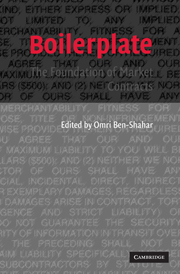Book contents
- Frontmatter
- Contents
- Preface
- List of Contributors
- PART ONE WHY IS BOILERPLATE ONE-SIDED?
- PART TWO SHOULD BOILERPLATE BE REGULATED?
- 6 Online Boilerplate: Would Mandatory Web Site Disclosure of e-Standard Terms Backfire?
- 7 Preapproved Boilerplate
- 8 “Contracting” for Credit
- 9 The Role of Nonprofits in the Production of Boilerplate
- 10 The Boilerplate Puzzle
- PART THREE INTERPRETATION OF BOILERPLATE
- PART FOUR COMMENTARY
- Notes
- Index
9 - The Role of Nonprofits in the Production of Boilerplate
Published online by Cambridge University Press: 02 December 2009
- Frontmatter
- Contents
- Preface
- List of Contributors
- PART ONE WHY IS BOILERPLATE ONE-SIDED?
- PART TWO SHOULD BOILERPLATE BE REGULATED?
- 6 Online Boilerplate: Would Mandatory Web Site Disclosure of e-Standard Terms Backfire?
- 7 Preapproved Boilerplate
- 8 “Contracting” for Credit
- 9 The Role of Nonprofits in the Production of Boilerplate
- 10 The Boilerplate Puzzle
- PART THREE INTERPRETATION OF BOILERPLATE
- PART FOUR COMMENTARY
- Notes
- Index
Summary
Editor's Note:Recognizing that the production of standard forms raises public good problems, Kevin E. Davis explores in this chapter the role of nonprofit organizations in the drafting and dissemination of contracts. He identifies reasons why the terms they draft might differ from those drafted by law firms and other profit-oriented entities and whether these differences have implications for state intervention in contracts.
Drafting contracts – by which I really mean the documents that embody contracts — requires investments of time, experience, and ingenuity. Those investments may yield significant returns because the quality of contractual terms can be an important determinant of the gains that parties realize from trade. This in turn suggests that from an economic perspective, it is important to understand how contractual terms and, in particular, widely used “boilerplate” terms are produced. Recent academic literature on this topic has focused on production of boilerplate by either for-profit actors — whether for their own use or for use by their clients — or the state. The dominant theme is that for-profit actors typically have suboptimal incentives to invest in production of contractual terms because they often cannot capture all of the benefits that flow from those investments. As for the state, the main concern is that it lacks the competence to formulate contracts that are suited to the diverse needs of private commercial actors.
- Type
- Chapter
- Information
- BoilerplateThe Foundation of Market Contracts, pp. 120 - 130Publisher: Cambridge University PressPrint publication year: 2007
- 9
- Cited by



